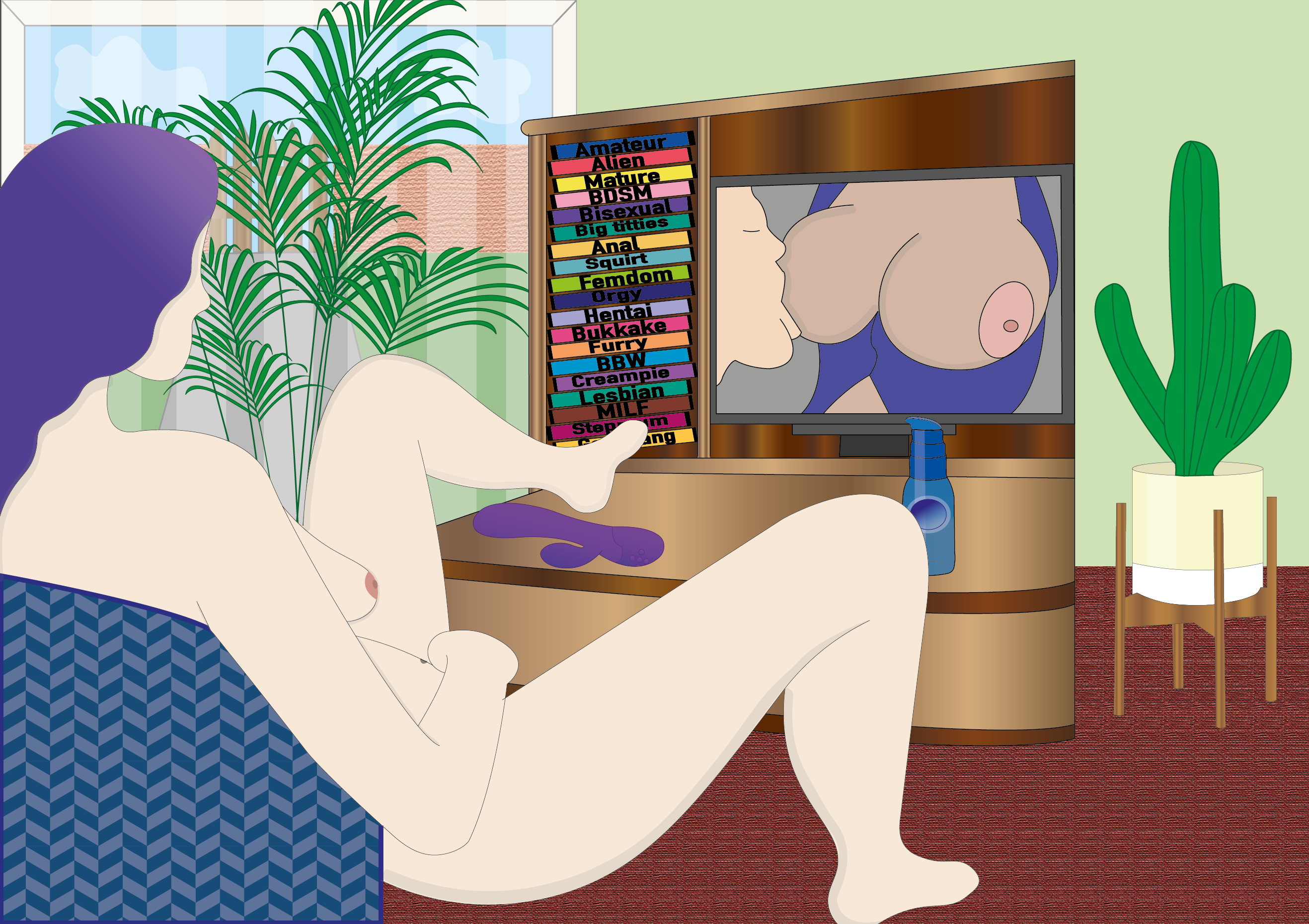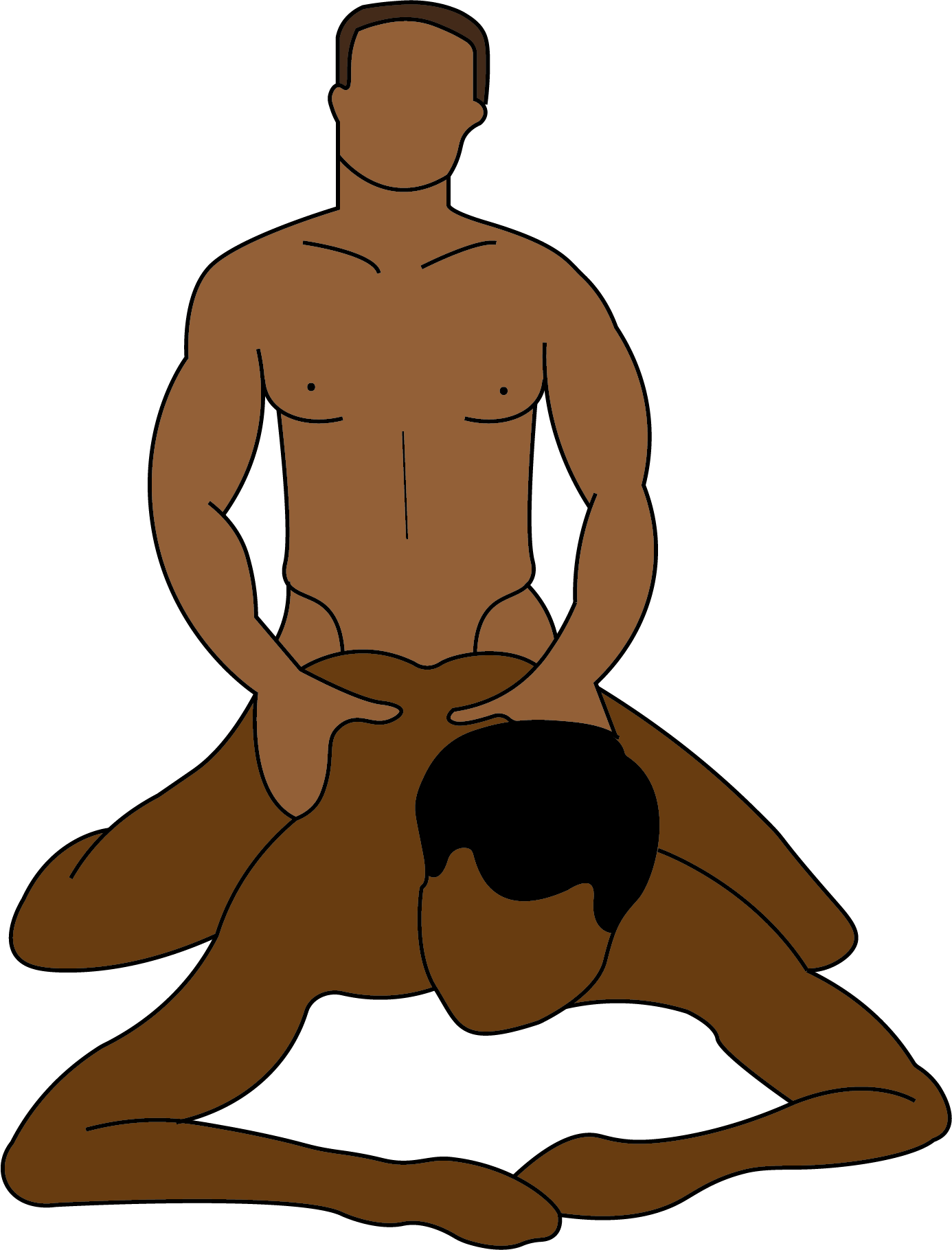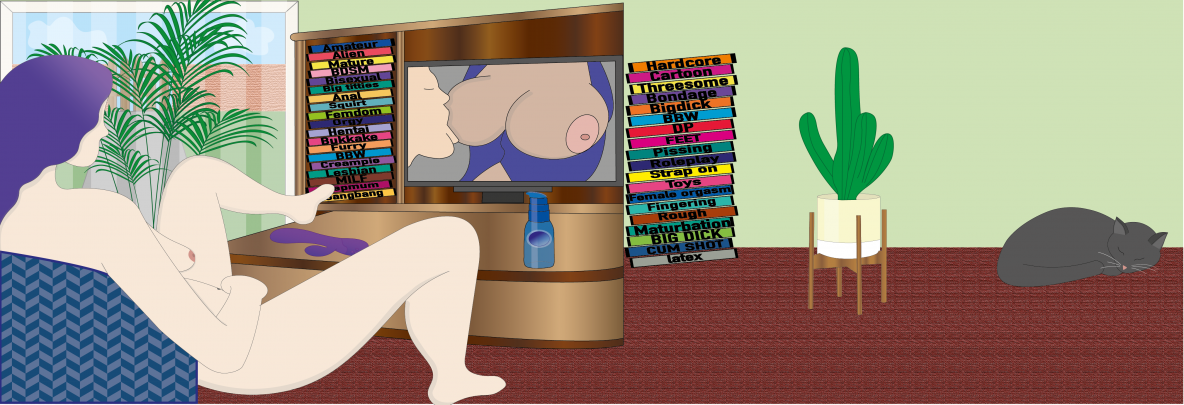is the porn you watch ethical?
It's time to shift the male gaze and move to more conscious click-habits
By Niamh Rowe / 23 March 2021

Illustration by Carys King Davies / Between The Sheets
As we approach a year of the coronavirus, we approach a year of unlawful sex.
We have found ourselves plunged in the worst sexual recession for decades, with a quarter of particularly law-abiding Brits saying they have had no sex at all in 2020 (blame it on the R rate?) Unlike the fragility of global markets, however, sexual desire conquers all, meaning a more sexually frugal society is moving online. In March 2020 PornHub launched a free premium service to console the horny new members of the Orwellian state, and in April usage was up by 18%. One study even found that coronavirus spikes mirrored spikes in porn usage. Whilst our digital sex lives grow, it's also been a year of clamping down on tech giants’ inadequate regulation of their content. This is the moment to do better.
PornHub is desperate to portray itself as the ‘wholesome’ pornography website. It provides snow ploughs to clear Boston streets and donates money to organisations fighting racial inequality. The conditions of the 30 days free premium service were 30 days of handwashing and mask-wearing. PornHub has more visitors each month than Amazon and Netflix. For a “bad brand”, it’s the one we hold dearest. Last year, when the explosive investigation by The New York Times was published, exposing the prevalence of non-consensual videos and footage of underage girls, the site deleted 80% of its videos. It’d be easy to assume that the work was now done. However, the site’s business model is structured to leave victims without justice. PornHub allows users to easily download and reupload content without identification; videos become lost in the abyss. Equally, this system means that sex workers can lose profits for their content. We like to isolate PornHub from other tech giants, forgetting that in reality, it’s no different to a Jeff Bezos or Mark Zuckerberg enterprise. It was named the third most influential tech company of the 21st century. If we want to meaningfully alter the pornography supply chain to respect workers’ rights and protect victims, we must hold it to the same account
“I do worry that modern-day internet pornography is giving teenage boys a sense that sex must always be an American Psycho performance of some sort,” Jeremy Clarkson recently explained in his column for The Times. “That if you are not having it in a pod on the London Eye, you are doing something wrong. And I, therefore, sympathise with women who find this both worrying in theory and wearisome in practice.” Clarkson’s concern about the dangers that pornography might inflict on us speaks precisely to the problem. Our ethical concerns about porn cannot help but centre the customer as a victim. Porn is reported as a phenomenon poisoning society; an evil that we must protect our wandering imaginations from, to return to an unsoiled version of sexuality that, spoiler alert, never existed, to begin with. This forgets a fundamental of capitalism – supply and demand.

It’s time to talk about the ethical sex consumer - not the ethical sex worker.
Videos of “American Psycho” sex exist because there is an appetite for it. For pornography, existence does not precede our essence. Clarkson instead reinforces the age-old othering of sex workers: they are dangerous and corrupting to men through their manipulation of temptation. William Acton, a journalist in the 1870s, describes sex workers as "ministers of evil passions, [who] not only gratify desire but also arouse it and suggest evil thoughts and desires which might otherwise remain undeveloped." One commenter on Mumsnet writes to a fellow user and sex worker: "you whores pander to men, you undermine women, you steal our husbands, you spread disease, you are a constant threat to society and morals." Society is so busy shining a critical lens on sex workers that we overlook our mindless consumption of a free and endless supply of content; a supply chain that leaves our thoughts as fast as it takes to clear search history.
Roughly 78 million people visit porn sites each day – more than the UK’s population. Porn maps the contours of where our minds can take us; the impugnation of porn is rooted in the mirror it holds up. Bridging the gap between consumer and sex worker requires understanding that it is a marketplace that we play a role in defining and perpetuating, and are thus responsible for. Only then can we have real discussions about how to protect the most urgent victims of pornography – the exploited women and men whose trauma recirculates time and time again online, evermore profiting their abusers. In one survey, 63% of underage sex trafficking victims said they had been advertised or sold online. Journalist Nicholas Kristof found that searching “exxxtra small teens” leads to over 155,000 videos. “Pornhub became my trafficker,” one victim told Kristof.
PornHub is owned by the porn conglomerate Mindgeek that owns over 100 porn sites and, as all monopolies do, eliminates competitors.
Despite its awesome presence in the industry, PornHub has just 80 regulators surveying content. Facebook has 15,000. Not only is PornHub failing to invest in the personnel to sufficiently regulate footage (and invest in the welfare of said regulators) but the laws of the internet still omits accountability. Section 230 of the US Communications Decency Act states that “no internet company is responsible for the content on its platforms.” Pressure on Big Tech to operate a zero-tolerance policy on misinformation and offensive content is growing, but the longer we corner-off PornHub as a dirty secret, reserved for incognito browsers, the less likely society is to demand real change from this monopoly. Following the Times’ investigation, MasterCard blocked all payments on the site as a declaration of solidarity with victims (and good PR). However, for sex workers, this suddenly removed their income, whilst their content was duplicated and spread elsewhere. The cycle continued – newly non-consensual footage circulated on porn sites. Workers became victims overnight.
Whether we like it or not, our sexual appetites have been shaped by porn and vice versa. Porn that depicts demeaning sex which damages real-life intimacy isn’t going to vanish overnight. Beyond more mindful consumption, taking porn out of the shadows could have the biggest impact on improving the system. We must bring women’s voices to the table. A study found that 25% of men said they don’t watch porn, compared to 58% of women. Normalising the act of watching porn reduces the associated shame women feel for searching for it, or dare I say discussing it. The male gaze floods porn sites, and women often feel like a perv with internalised misogyny for watching it. But demand determines supply; once women begin to hold greater market power in the sex industry, we can diversify the types of content being consumed, and hopefully topple the cult of the “submissive-teen caught-off-guard” for good.

Rather than wishing for a utopia where we can restart the clock on human fetish, it’s also more effective to collectively work as consumers to protect those featured on porn sites by demanding regulation, whilst deterring the creation of clearly problematic scenarios.
We will never be able to track each participant to verify their consent, especially as the line can be performatively blurred. Do they know this was filmed? Were they paid justly? Equally, calling for porn sites to be banned puts millions of workers out of an income overnight. Instead, if we wish to watch porn, we should pay for content and do our research into alternative porn sites that have a good track record for workers’ rights and verifying contributors.
We can be anti-porn culture and pro-porn. Erika Lust’s videos make porn an artistic experience (although, it's worth noting that in 2018 one performer alleged sexual assault against Lust) and Xconfessions and Bellesa dismantle the hegemony of the male gaze. The industry is also increasingly transcending mediums: on Dipsea stories, where you can access free and paid erotic stories and meditations, and erotic novels are on the norm. Last year, Sex During the Coronavirus Pandemic, by WH Fielding, was published, in which protagonist Lucy tries to satisfy her sexual desires while performing social distancing... Even erotic LGBTQ+ pornographic games are on the rise. Porn watchers have the same power of boycott as repenting Amazon Prime addicts.
Ubiquitous sexual content with no regulation is bad. Sex, however, isn't.
Words by
Art by
Share this article

